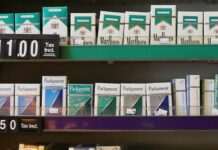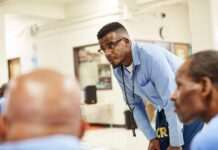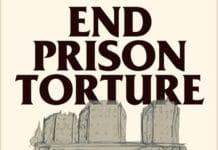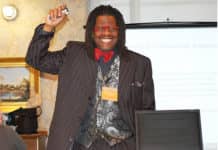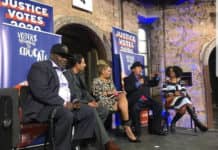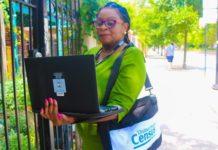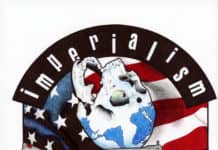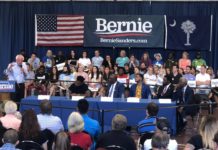
by Anh Lê
Ms. Verlie Mae Pickens, who is well known and a leader in the Bayview community, celebrated her 104th birthday on June 11, 2020. Every year for her birthday celebration, there is a large festive party and dinner to honor Ms. Pickens.
But this year, it was different. Because of the coronavirus pandemic, the party and dinner to honor Ms. Pickens in June had to be put on hold to prevent the spread of the virus due to large gatherings. Ms. Pickens received abundant loving birthday greetings and wishes from family members and friends throughout San Francisco and across the United States.
Earlier this year in the Bayview, on March 7, the 40th anniversary of the Black Cuisine Festival was held at the Dr. George W. Davis Senior Center on Carroll Avenue. The late Dr. George W. Davis, who established and directed programs in the Bayview Hunters Point community to help seniors for over four decades, founded the festival 40 years ago.

Dr. Davis inaugurated Black Cuisine to honor and celebrate African American culture and history by sharing the foods and special culinary dishes of African Americans in the U.S., aptly called “soul food.” Ms. Verlie Mae Pickens was there with Dr. Davis at the founding and has faithfully attended the event every year for the past 40 years.
Ms. Pickens prepared her famous delicious and tasty hog’s cheese specialty dish, which she learned from her mother growing up in Lake Charles, Louisiana. Ms. Pickens also made her scrumptious homemade peach cobbler dessert, also learned from her mother.
This year’s Black Cuisine was also affected by the pandemic. The soul food dishes could only be sold on a take-out basis. Many people from Bayview Hunters Point and beyond came to this year’s festival to support it, not hampered by the light drizzling rain that punctuated the day at times.
Catherine Davis, the executive director of the Dr. Davis Senior Center and wife of the late Dr. Davis, stated, “I thank people of the Bayview Hunters Point community and the Bay Area for honoring the memory and legacy of my late husband, Dr. George Davis.”
At this year’s Black Cuisine Festival, Ms. Davis presented Ms. Verlie Mae Pickens with a certificate of honor from San Francisco Mayor London Breed to honor Ms. Pickens for her many years of leadership in the community.

The framed large and beautifully designed certificate reads:
“WHEREAS, on behalf of the City and County of San Francisco, I am pleased to recognize and honor VERLIE MAE PICKENS on the occasion of San Francisco’s 40TH ANNUAL BLACK CUISINE FEAST.
“Over the decades you have lived in San Francisco, you have spent most of your life passionately serving your neighbors and your community.
“Throughout your years of supporting this important and lively event, you have demonstrated an unwavering commitment to highlighting the culture, style, music and cuisine of our City’s rich African American legacy and history.
“Your steadfast service to our residents through your volunteerism, kind spirit and limitless devotion to helping others is truly commendable and represents San Francisco values at their best.
“THEREFORE, I have hereunto set my hand and caused the Seal of the City and County of San Francisco to be affixed.
“LONDON N. BREED, MAYOR”
Ms. Verlie Mae Pickens brings a rich background that she shares with family members and friends, and everyone she interacts with in the community. The following is a condensed and edited version of several wonderful conversations I had with Ms. Pickens about her background. Ms. Pickens and I would like to share them with readers of the San Francisco Bay View newspaper.

Anh Lê (AL): Please share with us about your background.
Verlie Mae Pickens (VMP): I was born in Lake Charles, Louisiana, on June 11, 104 years ago. I was raised and grew up in Lake Charles.
I grew up in a large and loving family with many sisters and brother. We were raised by our very loving parents, Thomas Alfred Nisby and Lillian Nisby.
AL: Where were your parents born?
VMP: Both my mother and father were born in Louisiana, around the same area. Between Lafayette and New Orleans.
AL: Please share with us what life was like in Lake Charles.
VMP: My sisters, brother and I had a wonderful childhood as we were raised by our loving parents. We took care of our family’s vegetable garden and raised chickens and hogs. We went to school. We worked hard.
I remember walking with my brother and pulling a big wagon a long distance to a neighbor’s home twice a week to ask this woman if she had leftover foods that we could bring back home to feed the hogs.
We had to go to the back door of her house when we arrived there. She was always nice to us.
AL: May I ask you. Why did you have to go to the back door of her house to reach her?
VMP: The woman was White. So we had to go to the back door. Back then, that was how life was in Lake Charles.
AL: Do you mean that it was like that because it was the segregated South?

VMP: Yes.
AL: Could you please share more.
VMP: Blacks and Whites were segregated in Lake Charles. There were water fountains and bathrooms that only Whites could use.
Black kids and White kids went to different schools. Black children were not allowed to go swimming at the “For Whites Only” public swimming pool. At the movie theater, Blacks had to sit high up in the back of the theater.
The churches were segregated. Black people went to Black churches. White people went to White churches.
With the segregated schools, there were Black teachers at the Black schools. The Catholic nuns really did an excellent job in providing a good education for Black children in the Catholic schools. I went to a Catholic high school, got an excellent education and graduated from there.
AL: Please share with us more about life in Lake Charles.
VMP: We couldn’t go to the public swimming pool. So the Black kids could only go to the bayous. But they were dangerous places to go swimming. The bayous were unsafe bodies of water. And they also had crocodiles.
My brother went swimming at the port of Lake Charles. But it was dangerous there. The water was very deep. The ships that docked at the port were large.
I remember that whenever my brother went swimming at the port and came back home, my father would always know that he had swum there because he had this skin reaction or rash on his face. I think that there was something in that water at the port.
AL: Besides going to school and tending to the chores in your family, did you have any special activities?
VMP: I liked to play sports. I liked to play badminton.
My paternal grandfather is Charlie Nisby, and my paternal grandmother is Addie Nisby. My grandfather was born right before the end of slavery.
I took private piano lessons as a young girl. When I was 17, I started playing the piano at my church, Warren United Methodist Church. I love music. I love to sing.
Because I was the pianist at our church, to this day I know by heart the music and words to many songs and hymns sung at church.
AL: Could you please share with us about your grandparents.
VMP: My paternal grandfather is Charlie Nisby, and my paternal grandmother is Addie Nisby. My grandfather was born right before the end of slavery.
He was a sharecropper. He and my father worked hard together growing cotton. My father lived with his parents in a tiny shed.
As a sharecropper, my grandfather worked the farmland that was owned by Whites. My grandfather would buy the cotton seeds from the farm owner, plant the crops with my father and harvest the crops.
Since my grandfather was a sharecropper and did not own the farmland, he was at the mercy of the White landowner. One day, while my father was still young, the owner was selling the cotton seeds to my grandfather.
When my father heard the price that the owner was selling the cotton seeds to my father for, my father told his dad that the price was too high. Right away, the White farmland owner said to my grandfather, referring derisively to my father, “You’ve got an ‘educated’ ____ (racist term) boy there who knows some math.”
And the farm owner immediately kicked my grandfather and father off his farm, and expelled them to a tiny tract of land far away on the edge of town, on land that could not be farmed.
AL: Thank you very much for sharing with us about life in Louisiana and the struggles your family and your grandparents endured in the segregated Deep South.
I know that there is so much more to learn from you about what life was like in those days.
VMP: I want to say that not all of the people in Lake Charles were segregationists.
AL: When did you move to San Francisco?
VMP: I moved to San Francisco in 1940.
AL: What brought you all the way out here?
VMP: My mother asked me to come to San Francisco to help my brother and his wife, since they had a new baby.
My brother worked as a longshoreman. He helped to unload the items from the ships at the dock in San Francisco.
There was racial discrimination in San Francisco when I first arrived here. Blacks could not sit at the lunch counters in San Francisco. Black people could not rent places to live. Blacks had a hard time finding a job. You had to pay to get a job.
I wanted to work as a conductor on a street trolley car. But those jobs were saved for the men.
So my brother suggested that I get a job at an aircraft manufacturing plant in Los Angeles. The war was going on. The men were sent off to war.
I got a job as a “riveter” lady working on these planes. They handed us these tools, and showed us how to use them. They put us to work right away. So you see, the training was quick.
Be good to each other. Love one another. Try to help someone. Lend them a helping hand. It’s good to help others. Help a Senior, a child or a young person.
I worked hard, and did very well on the job. But after a while working on these planes, I developed lead poisoning from the materials we were using, so the doctor said I had to stop working there.
I went back to San Francisco. I worked for a doctor and his family. I took care of his children and helped to run the household. The doctor and his wife were very nice, and I enjoyed taking care of their children and the family.
I then worked at Blum’s Bakery, which was very well known in San Francisco. Blum’s made really high quality and delicious baked goods, pastries and cakes. I worked at Blum’s Bakery until I retired.
AL: You’ve worked hard all your life.
VMP: Yes, I have. I like working.
AL: Please share with us about your husband, Mr. Pickens.
VMP: I married Mr. Samuel Pickens. Mr. Pickens moved here from Lake Charles. He worked hard too. He worked at Best Foods. They are well known for their mayonnaise and other food products.
My husband and I worked hard and saved our money. We bought our house in the Bayview. We later bought a recreational vehicle. We liked to travel and explore new places. We drove our RV to visit Canada and Mexico. We have driven through and visited 49 states in the U.S. We didn’t go to Rhode Island.
AL: Could you please share with us some of the things you’ve been active in, in San Francisco.
VMP: I am a member of the Network for Elders, which is a group of seniors in San Francisco that gets together to help each other out and also does different projects to help the community. Beverly Taylor is the director of the Network for Elders. Beverly has been a dear friend of mine for many years. She was a public school teacher. Beverly has lived in the Bayview for many years.
I have been actively involved with the Dr. George W. Davis Center since it began. Before that, I volunteered at the Bayview Senior Multi-Resource Center on Yosemite Street, when Dr. Davis headed that center. I volunteered in the center’s breakfast program.
I also volunteered at Senior Action Network and the Senior University program there.
(Anh Lê served as the director of Senior University, which conducted classes for seniors in San Francisco on community organizing and leadership skills, in English, Spanish, Vietnamese, Chinese and Russian. Ms. Verlie Mae Pickens attended every class session of Senior University. Ms. Pickens received many graduation certificates from Senior University. Ms. Pickens also received special awards from Senior University for her dedication and her exceptional volunteerism to the community.)
At Senior University, we seniors in Bayview Hunters Point protested at the FoodsCo supermarket on Williams Street and demanded that they stop selling rotten foods in their store.
We testified at City Hall. We met with the Department of Public Health. We wrote letters to the corporation that owns FoodsCo. We were successful. FoodsCo stopped selling rotten foods in our community.
My home church is Jones Memorial United Methodist Church in the Western Addition district of San Francisco. I am one of the earliest members of this church.
AL: What else would you like to share with us.
VMP: I am so blessed to have such a large and loving family. I am truly deeply blessed. Our family tries to hold a big family reunion on a regular basis. Several years ago, we met in Lake Charles. We had a family reunion in San Francisco, and in Southern California. I am also very blessed to have so many good friends.
It’s so wonderful to see our country elect President Barack Obama, the first African American president in our nation.
I have photographs of President Obama and First Lady Michelle Obama and their daughters in my living room and magnets with their pictures on my refrigerator door. President Obama was such a great president.
Several years ago, my family and I visited the African American Museum in Washington, D.C. It was crowded when we were there. I recommend that you go visit this museum when you can.
AL: Do you have some words of wisdom you would like to share.
VMP: Be good to each other. Love one another. Try to help someone. Lend them a helping hand. It’s good to help others. Help a Senior, a child or a young person.
Be involved and active in your community. Volunteer in your community. Stay abreast with what is going on in your neighborhood and community, your city, your state and your country. Be well informed.
Exercise your right to vote. We have to make sure to vote.
I have strong faith in God. I pray. I like to wear this button when I go to church. It says, “God Is Good.”
My mother and father taught me a lot as I was growing up – that getting a good education is important. Working hard is important.
One of the things my father taught me was his motto, “Early to bed, early to rise, makes a person healthy, wealthy and wise.”
I eat just a couple meals at regular times each day. I love vegetables and fruits. I don’t eat much meat. For breakfast or brunch, I eat a hot cereal such as cream of wheat with some milk and some fruit.
I want to encourage every young person, “Get all the education you can.”
AL: Thank you very much, Ms. Pickens. Happy birthday to you, Ms. Verlie Mae Pickens! We wish you much happiness and good health always!
©Copyright by Anh Lê. Anh Lê has worked with the African American and Vietnamese American communities in San Francisco and the San Francisco Bay area for many years. He can be reached via editor@sfbayviewnews.wpenginepowered.com.

 Store
Store



